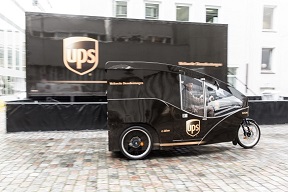Increasingly demanding consumers challenge parcel operators in Germany, PwC study says

German consumers are increasingly dissatisfied with the quality of parcel deliveries as logistics operators lack holistic concepts for last-mile deliveries in city centres, a new study “Break-up on the last mile – new ways for urban logistics" by the consulting company PwC revealed.
“The traffic systems of German cities are faced with a major challenge: the booming online trade creates a traffic flood in cities while at the same time there is no space in inner cities for product handling. Congestion and unpunctual deliveries are the result. The increasing noise and pollution are aggravating the problem. However, holistic concepts are still missing to make the outdated and inefficient urban logistics fit for the future,” PwC explained.
"The most important influencing factor for logistics providers and cities is the purchasing behaviour of end-users," Dietmar Prümm, Head of Transportation & Logistics at PwC in Germany, said. For this reason, PwC surveyed more than 1,000 consumers on their purchasing behaviour, their preferences in terms of parcel delivery and their acceptance of different distribution concepts for the last mile.
According to the study, one third of the German consumers surveyed are dissatisfied with the delivery service of parcel operators, 20% complain about unpunctual deliveries and 18% said they had received damaged shipments.
The results show that consumers attach importance to punctual, environmentally-friendly deliveries to a private address, with self-determined delivery time slots and permanent shipment monitoring (tracking). At the same time, 91% of the respondents want free parcel deliveries without having to pay anything for the service.
"This ambivalence puts the logistics providers under pressure. Consumers' demands increase logistics costs, but they also lack appreciation for their services. A rethinking is needed in the population,” Prümm said.
There is no improvement of the situation in sight. The share of online trade in the overall retail in Germany was just under 10% in 2016, with the trend rising. "In the future, not only the shipping volumes will increase, but also the complexity of delivery. New product groups such as refrigerated food place high demands on logistics. It will get even tighter and more time-critical on the last mile,” Prümm explained.
In order to cope with the increasing shipping volumes and to reduce costs, logistics operators need to work on technical innovations for the last mile. In this respect, they are experiencing another dilemma: the majority of consumers remain sceptical about drones, delivery robots and car trunk deliveries.
What is much more popular among consumers is electromobility as an environmentally-friendly and quiet alternative: for 61% of the respondents, delivery via electric vehicles or bicycles is an important criterion when choosing their online retailer. In many German cities, the noise and fine dust threshold values have been exceeded for years. The vast majority (77%) of the respondents would like more incentives for electric vehicles to deliver their parcels.
"This is why cities should establish incentives as quickly as possible, for example, the abolition of local or time-related access restrictions. They must now become active to maintain their attractiveness as a location for retailers, logistics companies and, above all, citizens,” Alfred Höhn, Director of the Public Sector at PwC, said.
City centres are already facing a space problem: “Scarce storage areas, lack of loading and unloading possibilities, strict access regulations and tight time slots for pedestrian zones leave hardly any space and time for the logistics operators to exchange goods,” Prümm said.
The space problem will intensify in the near future, not only in city centres but in the entire urban area, the study predicted. “Each household becomes a potential recipient of goods. The attempt by some cities to avoid or relocate traffic to make the urban area more attractive creates another goal conflict and the urban infrastructure remains overloaded.”
The survey suggests that cities should contribute to the solution of the problem through regulation, incentives and infrastructure measures and that promoting co-operations and combining different approaches to ensure the profitability of a project can contribute to success. “The logistics requirements and the financial and organisational capacities of cities are very different, so each city has to develop its own project," Höhn said.
The PwC experts recommend a mix of measures for the urban logistics of tomorrow. Among the citizens surveyed, overnight delivery in retail trade and measures for optimising land use were particularly well received, with 75% and 68% respectively. Sharing models promise efficiency gains, such as the joint use of logistics centres (multi-hubs) or distribution structures with smaller, partly mobile depots (micro-hubs) in urban areas, as well as the temporary use of parking spaces as loading and unloading areas. Digital approaches should be based on better use of traffic data for traffic planning and control through data platforms, as well as the use of apps for information and communication between the parties involved, PwC suggested.
"It is time to go new ways in urban logistics - for liveable cities of tomorrow," Prümm concluded.

